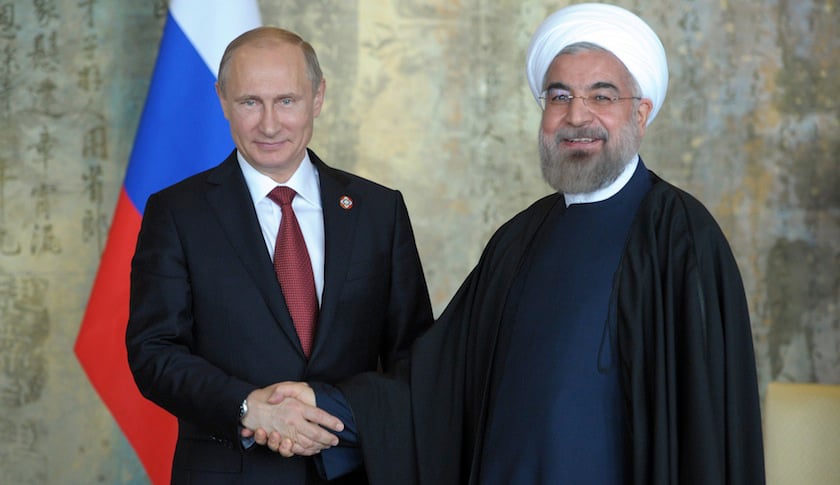
Russia’s President Vladimir Putin shakes with his Iran’s counterpart Hassan Rouhani. (Alexey Druzhinin/AFP/Getty Images)
As Iran’s economy is likely to become a bonanza for foreign companies in the upcoming years, Russia is preparing to secure its share. In early December, Tehran became the gathering spot for the executives of top Russian corporations seeking to extract commercial benefits, as Iran—a country of almost eighty million people and an economy worth more than $400 billion—is set to open up to the world.
The meetings were carried within the frameworks of two major events: the Intergovernmental commission for Trade and Economic Cooperation and the Russia-Iran Business Forum.
While the permanent Russo-Iranian Commission has taken place in the past, this year’s business forum by all accounts is an unprecedented event, highlighting the growing bilateral cooperation between Moscow and Tehran. By various estimates, the Russian delegation to Iran consisted of almost 200 business representatives, making it the largest group of Russian businessmen to ever visit the Iranian capital.
The diversity in businesses represented was one of the peculiarities of the delegation. In addition to the expected representatives from major Russian oil and defense corporations, there were also members of the top banks, agricultural companies, as well as governors and even the head of the Agency for Strategic Initiatives, an influential organization directly controlled by the Russian President. Overall, Russian and Iranian companies have signed nine deals that are potentially worth almost $10 billion, according to Bloomberg. Moscow and Tehran also signed agreements to construct a heat and power plant, and railway electrification worth more than €2.2 billion.
There are good reasons behind this. Year-on-year trade between the two nations has increased by almost 80%, according to the statement by Russian Energy Minister Aleksandr Novak. Novak has also stated that the amount of bilateral financial payments has tripled in 2016 alone. Hence, both sides are hoping to further commercial ties, increasing bilateral trade from $1.6 billion in 2014 to around $10 billion in the upcoming years.
Interestingly, the trade dynamics between Iran and Russia indicates one of the largest increase throughout all international Russian commercial ties, percentage-wise.
As the West maintains its sanctions regime against Moscow—even though the sanctions might be removed or softened in the upcoming years—many Russian businesses are desperate to find new “friends” abroad. Therefore, as Iran gradually opens up to the world, many in Russia perceive it as an opportunity and, in contrast to Western counterparts, are not afraid of repercussions of such “friendship” in the foreign policy arena.
Indeed, the growth in bilateral trade is easier to achieve due to Moscow’s and Tehran’s similar views on a number of key foreign policy issues, in particular regarding the Middle East. The Kremlin supports the Assad regime in Syria and maintains friendly ties with the current government in Iraq. Most people that I personally spoke to in Tehran were enthusiastically pointing out to the fact that Russia and Iran were each other’s “best friends” at the moment.
Walking in the streets of Tehran, the abundance of Chinese cars and Korean electronics is striking. For Russians, who are seeking to diversify their trade, the success of these Asian countries in Iran shows the path for their own trade expansion. While the West is more timidly entering the Iranian market, Moscow has the opportunity to take a lead in areas where it has sufficient competence and even a modest competitive advantage.
For instance, one of the proposals during the business forum was to promote a Russian alternative to Visa payments technology called “MIR”. Furthermore, many Russian banks look for opening exchanges with Iranian counterparts and even establishing headquarters in Tehran. Russia’s attempt might be particularly fruitful, taking advantage of the fact that Iran is still cut off from the SWIFT network.
Indeed, Moscow is specifically interested in banking, an industry that is potentially worth several trillions of dollars. As Russia is just beginning to expand its influence within the area, Iran’s experience might be helpful in boosting Islamic banking in the southern Russian territories in particular.
The future of the Iranian economic and its growth potential remain uncertain, even more so in the light of the statements of President-elect Trump and his hawkish rhetoric against the Iran Deal. Nevertheless, Russians do not seem to be bothered.